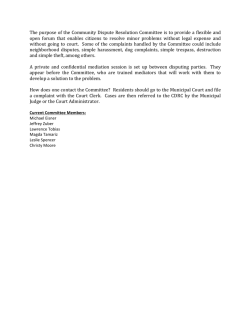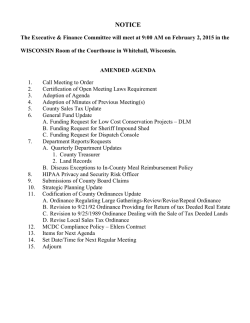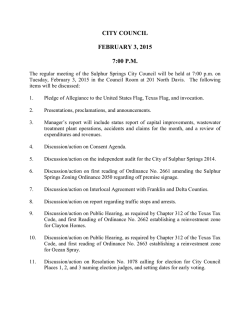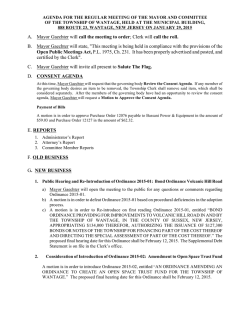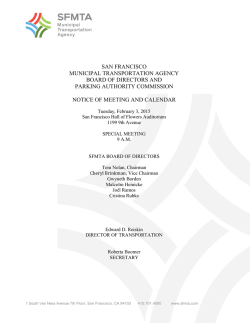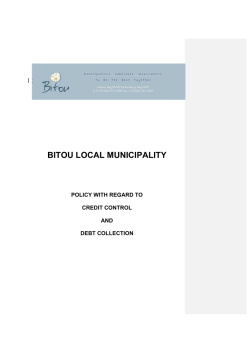
Download chapter. - Georgia Municipal Association
Municipalities: Sources and Limits of Power It has been stated on numerous occasions that Georgia is a “Dillon’s Rule” state, meaning that the power of municipal corporations is limited to powers expressly granted, powers implied in or incident to express powers, or “those essential to the accomplishment of the declared objects and purposes of the corporation – not simply convenient, but indispensable.” 1 Such rule also mandates that “[a]ny fair, reasonable, substantial doubt concerning the existence of power is resolved by the courts against the corporation, and the power is denied.”2 Despite an amendment to the Georgia Constitution in 1954 authorizing the General Assembly to allow municipal selfgovernment and the enactment of Home Rule Acts in 1962 and 1965, these limited characterizations of municipal powers continue to be respected and upheld by the courts. Georgia municipal corporations derive their power from a number of sources including the Georgia Constitution, state statutes and local legislation. The municipal charter is a type of local legislation. Additionally, municipalities may be granted power by federal laws enacted by Congress. The United States Constitution, federal laws, the Georgia Constitution, state statutes and local legislation also can limit the power of a city or direct that it act in a particular fashion. Finally, Georgia cities enact ordinances and resolutions to guide their own actions and the actions of those within the city limits. Georgia Constitution and State Statutes The highest level of state law governing municipal corporations is the Georgia Constitution of 1983 and its amendments. It is supreme to all general and local acts of the General Assembly as well as to city ordinances and resolutions. Any legislation inconsistent with the constitution is void from the time of enactment.3 With respect to the sources of power for municipal corporations, some of the more significant provisions of the Georgia Constitution are the Home Rule provision, the Supplementary Powers provision, the Zoning provisions, the Eminent Domain clause, the Intergovernmental Contracts provision, the Special District clause and the Gratuities clauses. Home Rule “Home Rule” is a doctrine under which municipalities and counties are delegated the autonomy to act with respect to their own affairs and without the need for specific legislative authorization. Additionally, home rule may act as a limitation on the state’s power to enact laws regarding matters falling within the home rule grant. The basic authority for municipal home rule in Georgia is found in the following constitutional provision: “The General Assembly may provide by law for the self-government of municipalities and to that end is expressly given the authority to delegate its power so that matters pertaining to municipalities may be dealt with without the necessity of action by the General Assembly.”4 Handbook for Georgia Mayors and Councilmembers 1 Municipalities: Sources and Limits of Power Acting upon this authority, the Georgia General Assembly passed specific enumerations of powers in 1962, now codified at Title 36, Chapter 34 of the Georgia Code, and later passed the Municipal Home Rule Act in 1965. Under the Home Rule Act the governing authority of a municipal corporation has the power to adopt clearly reasonable ordinances, resolutions or regulations relating to its property, affairs, and local government for which no provision has been made by general law and which are not inconsistent with the state constitution or any applicable charter provision.5 General powers granted by state statute also include, among others, the power to hire employees, set duties and compensation, establish departments, authorize municipal employees and agents to serve any process or summons in the city for activity in the city which violates a law or ordinance, establish retirement, merit and insurance systems for employees, contract with other governmental agencies or political subdivisions, and grant franchises to public utilities for use and occupancy of the streets.6 Code section 36-35-4 allows the governing authority to set the compensation and benefits of municipal employees and elected officials. Increases to the compensation of elected members of the governing authority cannot become effective until after the next regular election and cannot be adopted from qualifying date to inauguration date. Notice of intent to enact the increase must be published in the legal organ for 3 consecutive weeks immediately preceding its enactment. The Home Rule Act also permits amendment of the municipal charter by ordinance without the necessity of action by the legislature. Furthermore, the General Assembly cannot pass any local law to repeal, modify, or supersede any action taken by a municipal governing authority under this statute except with respect to matters reserved exclusively to the General Assembly.7 Municipal charters may be changed by a local act of the legislature, by initiative and referendum, or by an ordinance adopted by the city council.8 Changes by ordinance require adoption of the ordinance at two regular consecutive meetings not less than 7 nor more than 60 days apart. Publication is also required for 3 weeks within a period of 60 days immediately before final adoption. There are limitations on changing provisions included in the charter by initiative.9 Charter amendments are not effective until a copy of the amendment and an affidavit from the legal organ attesting to publication of the notice have been filed with the Secretary of State and in the office of the clerk of superior court. 10 Certain matters are reserved exclusively to the General Assembly and cannot be acted upon by the city through ordinance. Municipal corporations cannot enact charter amendments or ordinances which do any of the following: 1. Affect the composition and form of the municipal governing authority, the procedure for election or appointment to the governing authority, continuance or limitations on continuance in office;11 2. Define any criminal offense which is also an offense under Georgia law, provide for confinement in excess of 6 months, or provide for fines or forfeitures in excess of $1,000;12 3. Adopt a form of taxation beyond that authorized by the state constitution and laws; Handbook for Georgia Mayors and Councilmembers 2 Municipalities: Sources and Limits of Power 4. Affect the exercise of eminent domain; 5. Expand regulation over business activities regulated by the Public Service Commission beyond that authorized by charter, general law or the state constitution; 6. Affect the jurisdiction of any court; or 7. Change charter provisions relating to the establishment and operation of an independent school system. 13 Subject to certain conditions and limitations, the home rule statute authorizes municipal governing authorities to reapportion the election districts from which their members are elected. Reapportionment may occur after each decennial census and is required if the annexation of additional territory to the city has the effect of denying voters residing in that territory the right to vote for members of the governing authority on substantially the same basis as other municipal For more information see the GMA Municipal Redistricting Guide available at electors.14 www.gmanet.com . Supplementary Powers The Supplementary Powers provision, also known as Amendment 19 for the designation it had in 1972 when ratified by the voters as an amendment to the Georgia Constitution, is an important constitutional provision granting specific powers to cities. This provision spells out supplementary powers that municipalities and counties may exercise in addition to and supplementary to powers possessed by virtue of their charter or other local legislation. Specifically mentioned and included are the power to provide police and fire services, solid waste collection and disposal, public health facilities and services, street and road construction and maintenance, parks and recreational programs and facilities, storm water and sewage collection and disposal systems, water treatment and distribution, public housing, public transportation and libraries.15 This provision also states that, unless otherwise provided by law, no county can provide services within a municipality except by contract with the municipality. Likewise, unless otherwise provided by law, no municipality may provide services outside its boundaries except by contract with the affected county or municipality.16 Notably, municipal charter provisions are laws recognized by the courts as empowering municipalities to act pursuant to those provisions even in the absence of a contract with the county.17 However, intergovernmental agreements entered into between cities and counties pursuant to general state law or the intergovernmental contracts provision of the Georgia Constitution may act as a limitation on the ability of municipalities to provide extraterritorial services depending on the terms of the agreement. The Supplementary Powers provision also states that while the General Assembly may enact general laws on the subject matters addressed by the Supplementary Powers provision and can regulate, restrict or limit the exercise of such powers, the General Assembly may not withdraw any such powers. 18 Handbook for Georgia Mayors and Councilmembers 3 Municipalities: Sources and Limits of Power Zoning One of the most controversial duties undertaken by local governing authorities is zoning. The Georgia Constitution authorizes cities to adopt plans and exercise the power of zoning, but it allows the General Assembly to enact general laws establishing procedures for the exercise of that power, which the General Assembly has done (see Chapter 14). 19 However, the General Assembly has also reserved to itself the power to provide by law for “Restrictions upon land use in order to protect and preserve the natural resources, environment, and vital areas of this state….”20 Eminent Domain “The governing authority of each county and of each municipality may exercise the power of eminent domain for any public purpose subject to any limitations … provided by general law.”21 Both the United States Constitution and the Georgia Constitution require the payment of just and adequate compensation for the taking of private property for public purposes.22 A city can use eminent domain when a project satisfies three basic requirements: there must be a public purpose; the property owner must receive just and adequate compensation; and the city must comply with the statutory notice and proceeding requirements.23 In 2005, the United States Supreme Court ruled in Kelo v. New London that economic redevelopment constitutes a public use that can justify a taking.24 In response, Georgia law was amended to more strictly define “public use.”25 The new law states that economic development, on its own, is not a public use.26 Examples of public use include use by the public or government entities, for utilities, for roads and other transport purposes, for acquisition of property for which it is impossible to identify or locate the owners, for consensual condemnation, or to cure blight.27 The new law also narrowed the definition of blight.28 In addition to narrowing the definition of what constitutes blight and public use, the new law requires any condemned property to be dedicated to public use for twenty years. It also requires condemned land to be put to public use within five years or the city may face penalties, up to and including losing the property.29 Many of these new provisions have not been litigated, so courts have not had an opportunity to provide additional clarity to the law. Although sometimes unpopular, eminent domain or condemnation is an important power of local governments. “The governing authority of each county and of each municipality may exercise the power of eminent domain for any public purpose.”30 Landfills, sewer lines and jails are just a few of the public services provided by local governments that people rarely want located near them. Intergovernmental Contracts The Georgia Constitution authorizes the state, cities, counties and other political subdivisions to enter into intergovernmental agreements with one another or public agencies, corporations or authorities for a period not exceeding 50 years.31 Such contracts must deal with activities, services or facilities that the contracting parties are authorized by law to undertake or provide. 32 Intergovernmental contracts are frequently used to facilitate financing deals in conjunction with downtown development authorities, urban redevelopment authorities or other types of authorities.33 Handbook for Georgia Mayors and Councilmembers 4 Municipalities: Sources and Limits of Power In addition, intergovernmental contracts are utilized by cities and counties to provide services and facilities jointly, to provide services within the jurisdiction of another local government, and to act on a regional basis. Special Districts The constitutional provision on special districts authorizes the creation of special districts for the provision of local government services within such special district and the assessment of fees, taxes and assessments to pay for such services and to construct and maintain facilities for such services.34 Special districts can be created by a general state law that directly creates the district, by a general law requiring the creation of districts under conditions specified by general law, or by a municipal or county ordinance or resolution. An example of a special district created by general state law is the local option sales tax (LOST) statute that establishes 159 special districts in Georgia for the purpose of levying the LOST. 35 Although the tax is a local option activated by local referendum, the special district is established by general state law and the boundaries of the special districts in this instance are the same as the boundaries of Georgia’s 159 counties. As another example, the excise tax on hotel and motel rooms is also a special district tax established by general state law. 36 For the purpose of this tax the boundary of each special district is any city that separately levies a tax or, when the tax is levied by a county, the entire county minus the corporate limits of any municipality which separately levies the tax. An example of a special district created by local ordinance is a city business improvement district37 or a tax allocation district.38 Special service districts also are sometimes used by counties to provide services exclusively to or primarily for the benefit of residents of the unincorporated area, such as fire protection or garbage service.39 This arrangement is intended to avoid double taxing municipalities. Typically the services or facilities provided in a special service district are funded by special taxes, fees or assessments levied within the special service district. To facilitate the financing of improvements within a special service district, the Georgia Constitution authorizes municipalities to incur debt on behalf of a special service district when the municipality, at the time of or prior to incurring the debt, provides for assessment and collection of an annual tax within the special service district in an amount sufficient to pay the principal and interest within 30 years.40 However, the amount of debt incurred, when taken together with all other outstanding debt of the municipality, cannot exceed 10 percent of the assessed value of all taxable property within the municipality and a referendum must be held in which the qualified voters of the special district consent to incurring debt for the special district.41 Gratuities Two important constitutional provisions limit the power of cities to make contributions of public funds or property. The first one states that “…the General Assembly shall not have the power to grant any donation or gratuity or to forgive any debt or obligation owing to the public...” 42 The Georgia Supreme Court has held that this section applies to municipalities43 and that its purpose is to prevent the “extravagant outlay” of municipal funds.44 In a case involving a county contract with a private company for fire protection services, the court applied this provision. It held that local governments may furnish fire stations and fire-fighting Handbook for Georgia Mayors and Councilmembers 5 Municipalities: Sources and Limits of Power equipment for a private company’s use in providing fire protection. The court reasoned that no gratuity or donation is involved when the local government receives substantial benefits in return for the use of its property.45 Other decisions have acknowledged the principle that whether a municipality makes a donation or gratuity depends upon the benefits received by the city. A municipality cannot make a gift that conveys government property to a private party. For example, local government donations to a chamber of commerce, freight bureau, and a convention and tourist bureau have been held to violate this constitutional provision. In these cases, the local governments had not entered into a contract to receive benefits from the other party. 46 It has likewise been suggested that it is impermissible to expend public funds for the purpose of conducting a straw poll or public opinion referendum without statutory authority.47 The basis for this opinion is the constitutional provision which authorizes cities and counties to expend public funds to perform public services or functions authorized by the state constitution or by law.48 Because the expenditure of city or county funds must be authorized by some legislative Act or constitutional provision, expenditure of funds for a referendum is proper only if it is authorized such as in the case of certain annexations49 or to allow sales of liquor by the drink pursuant to O.C.G.A. § 3-4-91 or 3-4-92.50 The other constitutional provision prohibiting gratuities by municipal corporations states as follows: “The General Assembly shall not authorize any county, municipality, or other political subdivision of this state, through taxation, contribution, or otherwise, to appropriate money for or to lend its credit to any person or to any nonpublic corporation or association except for purely charitable purposes.”51 Although this provision contains an exception allowing the expenditure of money for purely charitable purposes, the authority to make charitable contributions must be specifically authorized by the General Assembly in a general statute or in local legislation. The authority to spend for general welfare purposes is not enough.52 All charitable donations must be purely charitable.53 Cities and counties are also prohibited from, directly or indirectly, making contributions or engaging in any activity to influence the outcome of an election or referendum. This prohibition extends to those acting on behalf of the city or county.54 Other Georgia Constitutional Provisions The 1945 and the 1976 Georgia Constitutions recognized two types of constitutional amendments; there were general constitutional amendments submitted to the people of the entire state and there were local constitutional amendments submitted only to the people of the political subdivisions directly affected.55 When the 1983 Constitution was being drafted, the decision was made to prohibit future local constitutional amendments but to provide a mechanism for continuing those already in existence.56 If action was not taken to continue a local constitutional amendment, it stood repealed no later than July 1, 1987. Local constitutional amendments continued in force may be repealed but may not be amended.57 Local constitutional amendments have been recognized by the courts to continue to have constitutional status.58 Handbook for Georgia Mayors and Councilmembers 6 Municipalities: Sources and Limits of Power Population acts are laws which classify and apply to political subdivisions based on population and are generally prohibited by the Georgia Constitution.59 However, legislation which repeals a population act or which amends a population act to allow it to continue covering political subdivisions already covered by such act is not considered an impermissible "population act" and is allowed.60 General law takes precedence over a local act.61 A general law is one having general application or at least applying to all municipalities and/or all counties. A local act is one that deals only with a particular city or county. Municipal charters are an example of local legislation. In general, provisions in municipal charters may be more restrictive of the city’s power than general law but may not be more expansive. Local Legislation Municipalities in Georgia, whether called a “city”, “town”, “municipality”, or “village”, are creatures of state law under O.C.G.A. § 36-30-1. They are created by the General Assembly’s adoption of a municipal charter. The municipal charter sets forth certain information such as the name and corporate limits of the municipality. It also enumerates the type of government the city will have and sets forth certain powers for the city governing body and elected officials. The charter may also address administrative affairs of the city, municipal finances, the municipal court and a variety of other topics. Although the municipal charter is originally adopted by the General Assembly, pursuant to the Home Rule Act, state law provides that municipalities may amend their charter as previously discussed. Ordinances and Resolutions Enacting ordinances and resolutions is a major responsibility of mayors and councilmembers. Equally important, however, is ensuring that members of the public have access to the enactments of the governing body. Codification Georgia law requires that each municipality provide for the general codification of all of the ordinances and resolutions of the municipality having the force and effect of law.62 The codification, and each ordinance and amendment to the general codification, is to be adopted by the local governing authority, published promptly and made available to the public at a reasonable price as fixed by the local governing authority. The codification is to be made available by posting it on the Internet or, in counties which have established a county law library, a copy may be furnished to the county law library. Cities having a population of 5,000 or less according to the most recent decennial census have the option of having their ordinances and resolutions compiled rather than codified. Such a compilation must include, at a minimum, the ordinances and resolutions arranged in a logical manner, such as by date, and preferably should include an index or other finding aids.63 Handbook for Georgia Mayors and Councilmembers 7 Municipalities: Sources and Limits of Power An important reason to codify a city’s ordinances is that Georgia statutory law allows courts to take judicial notice of a certified copy of any ordinance or resolution included within the codification required by Code Section 36-80-19. Any such certified copy is considered selfauthenticating and is admissible as proof of any such ordinance or resolution before any court or administrative body.64 Format For the most part, Georgia statutory law does not define the types of legislation that mayors and councils may enact, nor does it stipulate subjects to be treated by a particular type of legislation. Therefore, guidance regarding enactments must be obtained from reviewing a municipality’s charter and from court decisions. An early case stated as follows: [t]he distinction between an ordinance and resolution is usually considered to be that, while a resolution deals with matters of special or temporary character, an ordinance prescribes some permanent rule of government.65 A later case, providing a rather extensive discussion of municipal legislative enactments, asserted that [l]egislation by a municipal corporation must be put in the form of an ordinance, and acts that are done in a ministerial capacity and for temporary purposes may be in the form of a resolution.66 A municipal enactment may at times be called something other than an ordinance or resolution. But it should be noted that the name – ordinance, resolution, order, motion, etc. – given an enactment does not appear to be overly important to the courts and certainly not conclusive in determining its nature.67 However, in striving to define these terms, the courts have reached certain important conclusions regarding municipal ordinances. Generally, ordinances based on legislative authority are laws within the meaning of the Georgia Constitution. They have the same effect as local laws, such as city charter provisions, enacted by the General Assembly. Since they are considered local or special acts, they are void in any case for which provision has been made by an existing general law.68 Although state law does not dictate a required format for a municipal ordinance, it is important to review a city’s charter and previously adopted ordinances for provisions that may include requirements for inclusion in a municipal ordinance or resolution. However, there are some basic elements to a well-drafted ordinance that may allow a municipality to avoid challenges to the validity and meaning of its enactments: 1. The “title” provides an identifying name for the ordinance or resolution. Handbook for Georgia Mayors and Councilmembers 8 Municipalities: Sources and Limits of Power 2. The “preamble” briefly explains the purpose of the ordinance and the objectives sought to be accomplished by it. This may be quite lengthy and include findings of fact for certain types of ordinances such as those regulating adult entertainment. 3. The “enactment clause” formally declares the passing or adoption of an ordinance and identifies the enacting legislative body (i.e., the city council). 4. The “definition section” defines any words or phrases that have special meaning in the ordinance. 5. The “body” is the basic act itself, organized and divided into identifiable sections. 6. The “severability clause” stipulates that if any portion of the ordinance is held invalid, the remaining provisions continue in full force and effect. 7. The “repealer clause” abolishes previous ordinances that the municipal governing authority no longer wishes to be operative. A repealer clause that specifically identifies provisions to be abolished is far preferable to a general clause simply stating that “all conflicting enactments are hereby repealed.” The latter type can lead to confusion concerning which ordinances, or parts thereof, have been repealed. Additionally, an “equal dignity” rule governing the repeal or amendment of municipal ordinances exists in Georgia. This means that generally an ordinance must be repealed or amended by no less than another ordinance.69 8. The “effective date” specifies the date on which the ordinance becomes effective. Adoption of Documents and Maps Documents and maps may, in the absence of charter or other statutory provisions to the contrary, be adopted by reference, provided they are formally adopted and 1. 2. 3. 4. can be sufficiently identified “…so there is no uncertainty as to what was adopted”; are made public records; are “accessible to members of the public who are, or may be, affected by [them]”; and the adopting ordinance gives notice of such accessibility.70 Note that one such instance when a map must accompany an ordinance and not merely be referenced is in the context of zoning. The courts have held that the zoning map is an indispensable part of the zoning ordinance.71 Without a valid map, the zoning ordinance is void. “It is essential in order to enact the maps as a valid part of the ordinance that they be formally adopted and be treated in each step of the legislative process with all of the solemnity required for the text.” 72 Procedural Requirements Ordinances may be enacted prescribing procedures for passing ordinances. However, the courts generally view procedural requirements in municipal ordinances differently from those found in the city charter or other statutory law. In two cases where procedural requirements spelled out in an ordinance were not complied with, the court refused to invalidate subsequent ordinances that were not enacted in accordance with these procedures.73 The Georgia Supreme Court has held that a rezoning of property validly adopted even though the city did not comply with the Handbook for Georgia Mayors and Councilmembers 9 Municipalities: Sources and Limits of Power provisions in the city's charter regarding the adoption of ordinances. The court found that compliance with state law, the Zoning Procedures Law, was sufficient.74 Municipal Taxation and Spending The Georgia Constitution allows cities to impose taxes authorized by the Constitution or by general law. Additionally, local laws enacted by the General Assembly may authorize a city to levy and collect taxes and fees within the corporate limits of the municipality.75 Public funds can be expended to perform any public service or public function authorized by the State Constitution or by law.76 Issues of municipal taxation are more fully covered in Chapter 26. Federal Limitations The Supremacy Clause of the United States Constitution makes the United States Constitution, federal law and treaties the supreme law of the land.77 Additionally, the ability of local governments to take action in particular areas may be limited by a number of federal constitutional provisions notably including the First Amendment, the Fifth Amendment and the Fourteenth Amendment. As previously referenced, one part of the Fifth Amendment prohibits local governments from taking private property except for public use and upon the payment of just compensation. The First Amendment states as follows: "Congress shall make no law respecting an establishment of religion, or prohibiting the free exercise thereof; or abridging the freedom of speech, or of the press; or the right of the people peaceably to assemble, and petition the Government for a redress of grievances."78 Free speech issues may confront local governments and their officials in a variety of contexts including dealing with employees, access to public space for speeches and expressive conduct including parades or marches and displays in public space, billboard and sign regulations, newsstand regulations, and adult entertainment. Additionally local government officials must negotiate the often confusing path between respecting the free exercise of religion and avoiding the establishment of religion. The Fourteenth Amendment to the United States Constitution provides the guarantees of due process and equal protection. "No State shall make or enforce any law which shall abridge the privileges or immunities of citizens of the United States; nor shall any States deprive any person of life, liberty, or property, without due process of law; nor deny to any person within its jurisdiction the equal protection of the laws."79 Although the case law in these areas can be quite detailed, there are some basic guiding principles that can make these concepts easier to understand. Due process generally requires that an individual receive notice and an opportunity to be heard before the government does something detrimental to them while equal protection often boils down to treating similarly situated people the same without discrimination based on prohibited grounds. Handbook for Georgia Mayors and Councilmembers 10 Municipalities: Sources and Limits of Power NOTES 1 John F. Dillon, Commentaries on the Law of Municipal Corporations, 5th ed. (Boston: Little, Brown and Company), 1911), pp. 448-50. See Jewel Teac Company v. City Council of Augusta, 59 Ga. App. 260, 200 S.E. 503 (1938); Beazley v. DeKalb County, 210 Ga. 41, 77 S.E.2d 740 (1953); Weber v. City of Atlanta, 140 Ga. App. 332, 231 S.E.2d 100 (1976); H.G. Brown Family Ltd. Partnership v. City of Villa Rica, 278 Ga. 819, 607 S.E.2d 883 (2005). 2 Id. 3 City of Atlanta v. Gower, 216 Ga. 368, 116 S.E.2d 738 (1960); City of Savannah v. Hussey, 21 Ga. 80, 68 Am. Dec. 452 (1857) 4 GA. CONST. Art. IX, Sec. II, Par. II. 5 O.C.G.A. § 36-35-3 6 O.C.G.A. § 36-34-2 7 O.C.G.A. § 36-35-3(a). 8 O.C.G.A. § 36-35-3(b). 9 Id. 10 O.C.G.A. § 36-35-5. 11 O.C.G.A. § 36-35-6. See also Griffin v. City Council of Milledgeville, 279 Ga. 835, 621 S.E.2d 734 (2005) (holding that a governing authority may amend by ordinance its charter to alter responsibilities of a position or appoint a city manager). Krieger v. Walton County Board of Commissioners, 271 Ga. 791, 524 S.E.2d 461 (1999). 12 O.C.G.A. § 36-35-6. See also Lawal v. State, 273 Ga. App. 891, 893, 616 S.E.2d 205, 207 (2005) (holding that a city can impose a punishment for each offence, that each day is a separate offence, that fines are cumulative, and that jail terms may run consecutively). 13 O.C.G.A. § 36-35-6. 14 O.C.G.A. § 36-35-4.1 15 GA. CONST. Art. IX, Sec. II, Par. III(a). 16 GA. CONST. Art. IX, Sec. II, Par. III(b). 17 Kelley v. City of Griffin, 257 Ga. 407, 359 S.E.2d 644 (1987); Coweta County v. City of Newnan, 253 Ga. 457, 320 S.E.2d 747 (1984), see also Cobb County v. City of Smyrna, 270 Ga.App. 471, 606 S.E.2d 667 (Ga. App. 2004) (holding that a city can use a county water line that was brought into the city by annexation, regardless of whether a service agreement exists). 18 GA. CONST. Art. IX, Sec. II, Par. III(c). 19 GA. CONST. Art. IX, Sec. II, Par. IV; See O.C.G.A. § 36-66-1 et seq. 20 GA. CONST. Art. III, Sec. VI, Par. II. 21 GA. CONST. Art. IX, Sec. II, Par. V. 22 U.S. CONST. Amendment 5; GA. CONST. Art. I, Sec. III, Par. I. 23 O.C.G.A. Title 22; O.C.G.A. 32-3-1 et seq. 24 Kelo v. City of New London, 545 U.S. 469 (2005). 25 O.C.G.A. § 22-1-1(9). 26 O.C.G.A. § 22-1-1(9)(B). 27 Id. 28 O.C.G.A. § 22-1-1(1). 29 O.C.G.A. § 22-1-2(b)-(c). 30 GA. CONST. Art. IX, Sec. II, Par. V. 31 GA. CONST. Art. IX, Sec. III, Para. I. 32 Greene County School Dist. v. Greene County, 278 Ga. 849, 850, 607 S.E.2d 881, 883 (2005). See also DeKalb County v. City of Decatur, 297 Ga.App. 322, 677 S.E.2d 391 (2009). 33 See AMBAC Indemnity Corporation v. Akridge, 262 Ga. 773, 425 S.E.2d 637 (1993); Nations v. Downtown Development Authority of the City of Atlanta, 256 Ga. 158, 345 S.E.2d 581 (1986). 34 GA. CONST. Art. IX, Sec. II, Par. VI. 35 O.C.G.A. § 48-8-81. 36 O.C.G.A. § 48-13-50.1. 37 O.C.G.A. § 36-43-5. 38 O.C.G.A. § 36-44-8. Handbook for Georgia Mayors and Councilmembers 11 Municipalities: Sources and Limits of Power 39 See O.C.G.A. § 33-8-8.3 regarding expenditure of insurance premiums tax revenues to provide services to unincorporated area residents. But see Channell v. Houston, --- S.E.2d ----, 2010 WL 2718170 (2010) (holding that sheriffs are elected officers, not employees of the county, and that the county cannot create a special district for the provision of the sheriff’s office). 40 GA. CONST. Art. IV, Sec. V. Par. II 41 Id. 42 GA. CONST. Art. III, Sec. VI, Par. VI 43 Grand Lodge of Ga. I.O.O.F. v. City of Thomasville, 226 Ga. 4, 172 S.E.2d 612 (1970). 44 See Mayor of Athens v. Camak, 75 Ga. 429, 435 (1885). 45 Smith v. Board of Commissioners of Hall County, 244 Ga. 133, 259 S.E.2d 74 (1979). 46 Grand Lodge of Ga. I.O.O.F. v. City of Thomasville, 226 Ga. 4, 172 S.E.2d 612 (1970); Atlanta Chamber of Commerce v. McRae, 174 Ga. 590, 163 S.E. 701 (1931). 47 AG Op. U90-20. 48 GA. CONST. Art. IX, Sec. IV, Par. II. 49 O.C.G.A. § 36-36-58. 50 O.C.G.A. §§ 3-4-41, 3-4-91, and 3-4-92. 51 GA. CONST. Art. IX, Sec. II, Par. VIII. 52 Miller v. City of Cornelia, 188 Ga. 674, 4 S.E.2d 568 (1939). 53 Harris v. Gilmore, 265 Ga.App. 841, 842, 595 S.E.2d 651, 654 (2004). 54 O.C.G.A. § 21-5-30.2(b). 55 GA. CONST. 1945, Art. XIII, Sec. I, Par. I; GA. CONST. 1976, Art. XII, Sec. I, Par.I. 56 GA. CONST. Art. XI, Sec. I, Par. IV. 57 GA. CONST. Art. XI, Sec. I, Par. IV(b). 58 Columbus-Muscogee County Consolidated Government v. CM Tax Equalization, Inc., 276 Ga. 332, 579 S.E.2d 200 (2003) 59 GA. CONST. Art. III, Sec. VI, Para. IV. 60 O.C.G.A. § 28-1-15. 61 GA. CONST. Art. III, Sec. VI, Par. IV. 62 O.C.G.A. § 36-80-19. 63 Id. 64 O.C.G.A. § 24-7-22. 65 City of Rome v. Reese, 19 Ga. App. 559, 91 S.E. 880 (1917). 66 Allen v. Wise, 204 Ga. 415, 50 S.E.2d 69 (1948). 67 See Id.; Western and Atlantic Railroad v. Swigert, 57 Ga. App. 274, 195 S.E.230 (1938). 68 O.C.G.A. §§ 36-35-3 and 36-35-6; City of Atlanta v. S.W.A.N. Consulting & Sec. Services, Inc., 274 Ga. 277, 553 S.E.2d 594 (2001), Jenkins v. Jones, 209 Ga. 758, 75 S.E.2d 815 (1953); City of Columbus v. Atlanta Cigar Company, Inc., 111 Ga. App. 774, 143 S.E.2d 416 (1965). 69 Harper v. The Mayor and Council of Jonesboro, 94 Ga. 801, 22 S.E. 139 (1894). 70 Friedman v. Goodman, 219 Ga. 152, 132 S.E.2d 60 (1963); City Council of Augusta v. Irvin, 109 Ga. App. 598, 137 S.E.2d 82 (1964); Waldrop v. Stratton and McClendon, inc., 230 Ga. 709, 198 S.E.2d 883 (1973); Foskey v. Kirkland, 221 Ga. 773, 147 S.E.2d 310 (1966). 71 Bible v. Marra, 226 Ga. 154 (1970); City Council of Augusta v. Irvin, 109 Ga. App. 598, 137 S.E.2d 82 (1964). 72 City Council of Augusta v. Irvin, 109 Ga. App. 598, 137 S.E.2d 82 (1964); Foskey v. Kirkland, 221 Ga. 773, 147 S.E.2d 310 (1966). 73 South Georgia Power Company v. Baumann, 169 Ga. 649, 151 S.E. 513 (1929); Ellis v. Stokes, 207 Ga. 423, 61 S.E.2d 806 (1950). 74 Little v. Lawrenceville, 272 Ga. 340, 528 S.E.2d 515 (2000). 75 GA. CONST. Art. IX, Sec. IV, Par. I. 76 GA. CONST. Art. IX, Sec. IV, Par. II. 77 U.S. CONST. Art. VI. 78 U.S. CONST. Amend. 1. 79 U.S. CONST. Amend. 14. Handbook for Georgia Mayors and Councilmembers 12
© Copyright 2026
